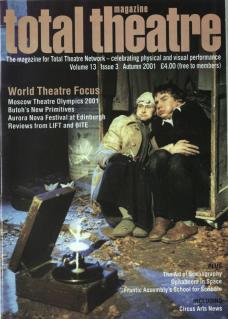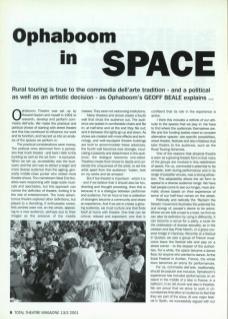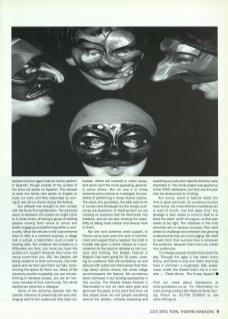Ophaboom Theatre was set up by Howard Gayton and myself in 1991 to research, develop and perform commedia dell'arte. We made the practical and political choice of starting with street theatre and this has continued to influence our work and its function, and has led us into an analysis of the spaces we perform in.
The practical considerations were money. The political ones stemmed from a perception that much theatre – and here I refer to the building as well as the artform – is exclusive. When we set up, accessibility was the buzzword, and the aim was to attract a larger and more diverse audience than the ageing, generally middle-class punter who visited most theatre shows. The mainstream West End theatres were responding with large-scale musicals and spectacles, but this approach can narrow the definition of theatre, limiting it to the role of entertainment. The more adventurous theatre explored other definitions, but played to a dwindling, if enthusiastic crowd. Arts centres were not, on the whole, appealing to a new audience, perhaps due to their images as the preserve of the middle classes. They were not welcoming institutions.
Many theatres and shows create a fourth wall that shuts the audience out. The audience are seated in comfortable chairs and file in; at half-time and at the end they file out and in between the lights go up and down. As shows are created with more effects and technology, and well-equipped theatre buildings are built to accommodate these advances, the fourth wall becomes ever stronger, inculcating a passivity and detachment in the audience: the dialogue becomes one-sided. Theatres create their shows to dazzle and celebrate the uniqueness of the artist, to set the artist apart from the audience: 'Listen, look on my works and be amazed.’
But if live theatre is important – which it is – and if we believe that it should also be fun, diverting and thought provoking, then this is because it is a dialogue between performer and audience. For an hour or two a collection of strangers become a community and share an experience. And if we are to create a growing audience, we must nurture one that finds itself at home with theatre. One that can be critical, relaxed and expectant; one that is confident that its role in the experience is active.
I think this includes a rethink of our attitude to the spaces that we play in. We have to find where the audiences themselves are. We and the funding bodies need to consider alternative spaces: site-specific possibilities, street theatre, festivals and also initiatives that take theatre to the audience, such as the Rural Touring Schemes.
One of the reasons that physical theatre is seen as a growing theatre form is that many of the groups are involved in this redefinition of space. For us, commedia's potential to be versatile, both during performance and in its range of possible venues, was a strong attraction. This adaptability allows the artform to appeal to a diverse audience range. We have had people come to see our longer, more dramatic shows based on their experience of some of our half-hour romps on the street.
Politically and radically the 'Reclaim the Streets' movement illustrates the potential for and energy of people's desire to be active. Where we are told a road is a road, we find we can alter its definition by using it differently. It can become a venue for a party, a route for the celebration of diverse sexuality, as in the Lesbian and Gay Pride March, or a grass-covered bridge in Hackney. Recently at a festival in Quebec we saw a group of French musicians leave the festival site and play on a street corner – to the despair of the authorities. For a while, the space became a dance floor, for anyone who wanted to dance. At the Eclat Festival in Aurillac, France, the whole town becomes an arena for performances.
For us, commedia dell'arte, traditionally, should be popular and inclusive. Ophaboom's experience has included performances on an island in the middle of a lake in France, in a ballroom, in an old church and also in theatres. We are proud that we strive to work in circumstances that allow an audience to feel that they are part of the show. At one major festival in Spain, we successfully argued with our bookers and our agent that we had to perform in Spanish, though outside of the context of the show we spoke no Spanish. This allowed at least one family who spoke no English to enjoy our work, and they responded by coming to see all our shows during the festival.
Our attitude has brought us into contact with the Rural Touring Networks. The schemes seem to represent the closest we might come to in these times, of having a group of strolling players moving from venue to venue and briefly engaging and performing within a community. What the venues in the rural schemes have to offer is a constant surprise – a village hall, a school, a badminton court or even a bowling alley. But whatever the limitations or difficulties you face, you know you have the audience's support because they know the venue more than you. We, the players, are being invited into their community, into their space, and we then spin them our tale, transforming the space for them too. Many of the schemes provide hospitality: you are not performing to faceless people, you are an honorary member of their community. The whole experience becomes a dialogue.
Some of the schemes operate with the specific intention of presenting new and challenging work to the audiences they have cultivated, others are involved in urban areas, and some want the more appealing, generally comic shows. But we owe it to these schemes and ourselves to investigate the possibility of performing in these diverse spaces. The press, the accolades, the safe options lie in London and Edinburgh but the hungry audiences are elsewhere. In feeding them we are creating an audience that will itself enter into theatres, and we are also creating the possibility of taking more radical and diverse work to them.
But the rural schemes need support. In France we've seen seen the level of commitment and support that is needed: the Eclat in Aurillac was given a blank cheque by a businessman for five years to develop its own success and funding. The Baalen Festival in Belgium has been going for fifteen years, creating an audience that will confidently sit and discuss with artists and themselves their feelings about certain shows; the whole village accommodates the festival. We sometimes seem confused in our funding approaches in this country. The Streets Ahead Festival in Manchester is one we have seen grow and grow over the years, to the point that when we last played there we met people wandering around the streets, critically assessing and searching out acts and material that they were interested in. The whole project was geared up to the 2000 celebration, but that was the year that the festival lost its funding.
Any venue, event or festival needs the time to grow and build. As numerous surveys have found, the most effective marketing tool is word of mouth, and that takes time. Any strategy or plan needs to commit itself to at least five years' worth of support, so that plan needs to be right. The initiatives in the rural schemes are an obvious success; they need artists to challenge and entertain the growing audience that they are encouraging. We need to learn from their success how to empower the audience, because that is how you create new audiences:
‘It is always popular theatre that saves the day. Through the ages it has taken many forms, and there is only one factor that they have in common: a roughness. Salt, sweat, noise, smell: the theatre that's not in a theatre ...' (Peter Brook, The Empty Space)
Find out more about Ophaboom at www.ophaboom.co.uk For information on rural touring contact the National Rural Touring Forum on 01759 303624 or see www.netf.org.uk


